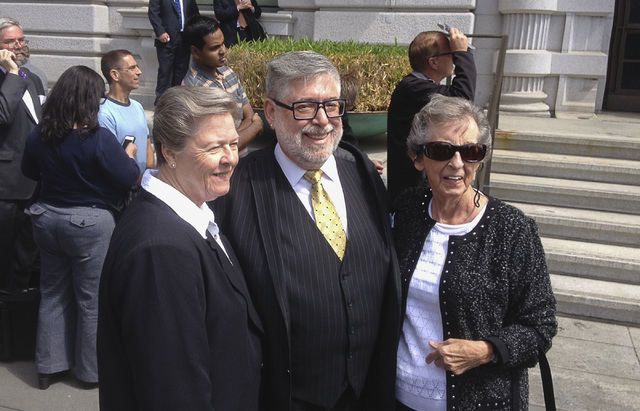Gay marriage: All about the children
Nevada’s gay marriage ban should be upheld because allowing gay couples to marry would erode a very important message sent by the state, namely that society expects fathers to remain in committed relationships with mothers and their children.
That was the oft-repeated argument advanced to a three-judge panel of the 9th U.S. Circuit Court of Appeals by Monte Stewart, the Idaho attorney representing the Coalition for the Preservation of Marriage, the group that qualified the gay-marriage ban for the Nevada Constitution back in 2000 and 2002.
“When you change the meaning of the institution, you change the message,” said Stewart, who argued on behalf of the state of Idaho and the Coalition in two separate cases Monday. (The Nevada case is Sevcik v. Sandoval, 12-17668.) “Meanings matter in this arena.”
The Coalition was the only group arguing to keep Nevada’s marriage ban intact, after Attorney General Catherine Cortez Masto and Gov. Brian Sandoval decided to abandon the state’s defense of the law in February.
Stewart argued that allowing gay marriage would lead to “fatherless children” as the institution of heterosexual marriage lost respect and appreciation in a system that extended marriage rights to gay couples as well as straight ones. The traditional marriage idea extends the “strong social expectation” that fathers form bonds with their children, thus preserving what Stewart dubbed the “child’s bonding right.”
Judges Stephen Reinhardt and Marsha Berzon closely questioned Stewart’s contention, peppering him with questions, including whether no-fault divorce presents a greater threat to marriages than the prospect of gay marriage.
Not only that, but states don’t prohibit marriage to straight couples who don’t intend to have children or are no longer of child-bearing age. And gay couples can also adopt and raise children, forming the same family bonds that Stewart identified as being critical to heterosexual couples.
His opponents also took aim squarely at those arguments. Idaho attorney Deborah Ferguson noted similar arguments were rejected by the U.S. Supreme Court in U.S. v. Windsor, a seminal 2013 case that invalidated the Defense of Marriage Act. In addition, she said, the Idaho Legislature did not rely on those justifications when passing that state’s anti-gay marriage law.
She said the only message Idaho was sending via its laws banning gay marriage was to children of gay couples — that their parents’ relationship was somehow less worthy of recognition than those enjoyed by the parents of straight couples.
Tara Borelli, representing Lambda Legal in the Nevada case, went further, saying allowing gay marriage has nothing whatsoever to do with encouraging fathers to establish family bonds in straight relationships, a conclusion supported by the Windsor ruling, she said. “One does not affect the other,” she said. The only real effect of the law is to humiliate and stigmatize gay couples by treating them dissimilarly than straight ones.
And she dismissed the idea that straight couples would either not have children or not stay together as a family if gay marriage were allowed in Nevada, nor would repealing the ban on gay marriage somehow devalue men as fathers and husbands.
Attorneys arguing for gay marriage said the 9th Circuit’s recent decision in SmithKline Beecham Corp. v. Abbott Laboratories established a higher degree of scrutiny in the circuit for cases that discriminate against gays and lesbians, although Stewart disagreed. He said the laws in Idaho and Nevada could survive any level of judicial scrutiny, as states have the rights to make determinations about the definition of marriage.
Based on the fact that Reinhardt wrote the powerful opinion striking down California’s Proposition 8 anti-gay marriage state constitutional amendment, and the openly skeptical questions posed by Berzon, it seems as if Sevcik v. Sandoval will go to the appellants. In that instance, the Coalition for the Preservation of Marriage may ask for an en banc re-hearing before the entire court. But the group may not appeal to the U.S. Supreme Court, since it lacks standing under the 2013 ruling in Hollingsworth v. Perry. That means a 9th Circuit ruling striking down Nevada’s ban on gay marriage could pave the way for marriages to begin in short order.






















